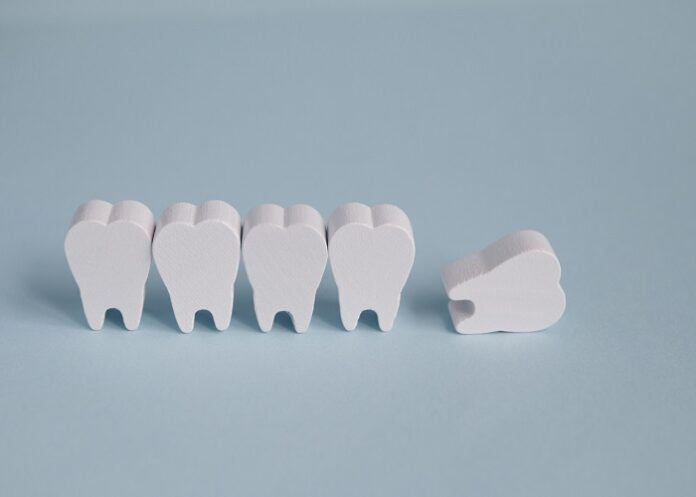Severe teeth loss – which can happen in older age – is not just a dental issue but could also be linked to a 66% greater risk of dying from heart disease, stroke and other fatal heart events, a team of researchers has suggested after a recent analysis.
Previous studies have – more broadly – pointed to a link between missing one or more teeth and a higher risk of heart disease and cardiovascular diseases (CVD), the group of conditions affecting the heart and blood vessels which, tallied together, represent the leading cause of death globally.
While it is plausible that tooth loss or poor oral hygiene could allow dodgy pathogens to penetrate the gums, causing infections that seep into circulation and trigger inflammation that may affect the heart, other factors playing into heart health and CVD risk range from smoking and exercise to diabetes, cholesterol levels and blood pressure.
This makes it difficult for researchers to establish whether or not a causal connection between tooth loss and cardiovascular disease actually exists, reports Science Alert. Some studies suggest not – the association between tooth loss and CVDs disappeared once smoking was factored into a 2018 analysis – whereas others have yielded evidence supporting a causal link.
In efforts to clarify some of those contradictions, the latest analysis focused on severe tooth loss, pooling data from 12 published studies that each tracked oral and CVD outcomes for between three and 49 years.
“Our findings clearly show that tooth loss is not just a dental issue, but a significant predictor of cardiovascular disease mortality,” said Anita Aminoshariae, an endodontist and dental researcher at Case Western Reserve University in Ohio.
People who had lost all or most of their teeth had a 66% higher risk of dying from heart-related issues than those who had lost only a few teeth or none at all, the analysis found.
This association varied far more across the five studies that looked at people who had fewer than 10 teeth remaining than it did among the seven studies of people who had no teeth left.
But the elevated risk of dying from cardiovascular disease remained, evident among people who had lost roughly 22 or more chompers.
All 12 studies in the analysis adjusted for age and smoking status, and 10 of them considered at least five critical confounding factors associated with CVD risk.
When the researchers tested whether these factors affected their results, the heightened risk persisted, “confirming the impact of [severe] tooth loss on CVD mortality”, wroteAminoshariae and colleagues in their paper, published in the Journal of Endodontics.
While this analysis of observational studies can only point to associations, not direct causes, it suggests the global burden of CVDs could be partly addressed by improving oral health.
In 2019, one-third of deaths worldwide were caused by CVDs including heart attack, stroke, clogged arteries, and heart failure.
Study details
Tooth Loss is a Risk Factor for Cardiovascular Disease Mortality: A Systematic Review with Meta-analyses
Anita Aminoshariae, Ali Nosrat, Aleksandar Jakovljevic et al.
Published in Journal of Endodontics on 28 June 2024
Abstract
Introduction
The current evidence linking tooth loss and cardiovascular disease mortality is inconclusive. Thus, the aim of this systematic review was to explore the association between tooth loss and cardiovascular disease (CVD) mortality.
Methods
A comprehensive literature search of databases and gray literature included: Web of Science, Scopus, PubMed, Cochrane Central Register of Controlled Trials, Google Scholar, various digital repositories. The included studies reported on CVD mortality and tooth loss. The Newcastle-Ottawa scale was used to assess the quality of included studies. Random-effects meta-analysis method, sub-group analysis (based on the tooth loss categories (edentulous and fewer than 10 teeth present), meta-regression (based on the number. of confounders), publication bias, and sensitivity analysis were performed.
Results
Twelve articles met the eligibility criteria with an overall “Good” quality. A significant association between tooth loss (edentulous or less than 10 teeth present) and CVD mortality was found in the primary meta-analysis, which compiled data from 12 studies. The estimated hazard ratio was 1.66 (95% CI: 1.32–2.09), and there was high heterogeneity (I2 = 82.42). Subgroup analysis revealed that the edentulous subgroup showed a higher risk with no significant heterogeneity, while the subgroup with fewer than 10 teeth showed a higher risk with substantial heterogeneity. Meta-regression analysis did not reveal any significant impact (P = .626) on whether variations in the number of confounders across studies would substantially affect the overall findings. No publication bias was detected and the sensitivity analysis based on the critical confounders also confirmed that tooth loss as a risk factor for CVD mortality (hazard ratio = 1.52, 95% CI: 1.28–1.80), (I2 51.82%).
Conclusion
The present systematic review reported that being edentulous or having lesser than 10 teeth is a predictive indicator of CVD mortality.
See more from MedicalBrief archives:
Oestrogen reduces tooth and gum disease in post-menopause
WHO warns of oral health crisis in South Africa
Gum infection a risk factor for heart arrhythmia – Japanese study

